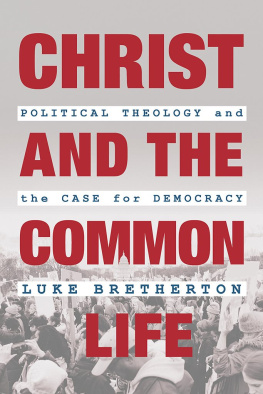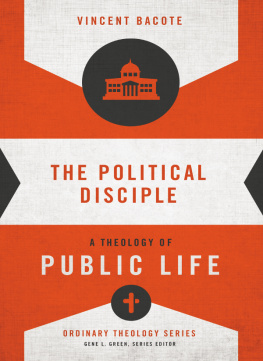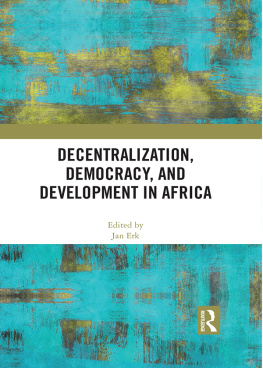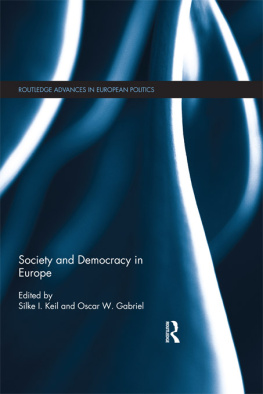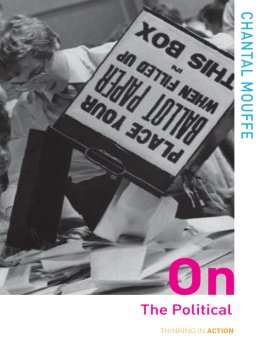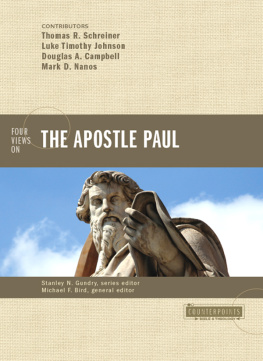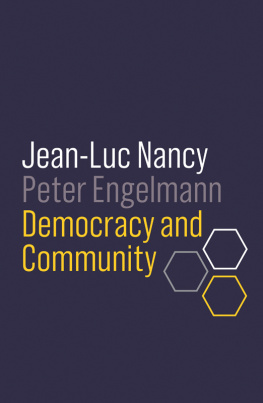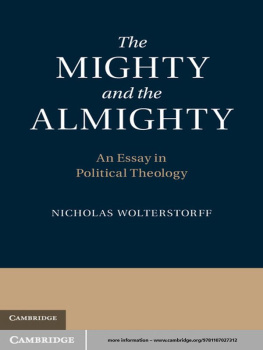Christ and the
Common Life
Political Theology and the Case for Democracy
Luke Bretherton
WILLIAM B. EERDMANS PUBLISHING COMPANY
GRAND RAPIDS, MICHIGAN
Wm. B. Eerdmans Publishing Co.
4035 Park East Court SE, Grand Rapids, Michigan 49546
www.eerdmans.com
2019 Luke Bretherton
All rights reserved
Published 2019
252423222120191234567
ISBN 978-0-8028-7640-9
eISBN 978-1-4674-5643-2
Library of Congress Cataloging-in-Publication Data
A catalog record for this book is available from the Library of Congress.
In memoriam
Michael Stocking
(19672016)
Contents
This book provides an introduction to historical and contemporary theological reflection on the meaning and purpose of politics, while at the same time making a case for why Christians should be committed to democracy as a vital means for pursuing a flourishing life. It is born out of involvement in or teaching about the interaction of Christianity and politics throughout my working life. Whether in the European or North American context, I consistently encounter the same question being asked by those I work alongside or teach as they try to make sense of the social, economic, and political problems and conflicts they face. The question goes something like this: Its all very well being told to love our neighbors, but when it comes to politics, of what does neighbor love consist? Like a triangle, this question has three sides to it. The first is, what is the appropriate response to the poverty, suffering, and injustice one encounters in trying to love ones neighbors? Much theological thinking about politics is inspired by and taken up with debates about how best to answer this question.
The second side is this: In loving my neighbor, how can I keep faith with my distinctive commitments while also forming a common life with neighbors who have a different vision of life than I do? Another way to put this question is, how should our own roots, our sense of what counts as home, identity, or belongingthat is, what makes us distinctive and particularbe coordinated with and ordered in relationship to those we find strange or who dont share our beliefs and practices? Again, much of political theology tries to answer this second question, as the creation and sustaining of a common life between Christians and non-Christiansor church and worldis a central concern.
The third, often unacknowledged side to the issue of neighbor love in politics is the question of what kind of power shapes the relationship between oneself and another and how this power is distributed. This third question is fundamental to any account of human flourishing and identifies a central problem that politics addresses. Politics is about forming, norming, and sustaining a common life between those who are the same and those who are different (however conceived), as configurations of power shape the conditions of life together at various scales from the local to the global. A common life with and for others (including nonhuman life) is a prerequisite for human flourishing: the good or flourishing life cannot be reduced to individual happiness as we are not atomized monads but mutually vulnerable, interdependent creatures whose flourishing depends on being embedded in just and loving forms of common life. Therefore, a central concern of political theology is how power is constructed, circulated, and distributed within patterns of shared life, at whatever scale that life takes. Keeping these three concerns in play throughout, this book examines different theological ways of answering questions about how to respond to poverty and injustice, how to form a common life with strangers and enemies, and how to handle and distribute power constructively.
Amid the perils and paradoxes that the interaction of Christianity and politics brings, it is easy to get confused or lost. Like a map, this book aids the navigation of political life and its positive and negative roles in fostering faithful, hopeful, and loving ways of being alive with and for others. Its chapters add up to a kind of field guide, providing orientations and markers to help readers traverse the contemporary political landscape, name its features, and identify some of the characteristic ways Christians make sense of politics and go about trying to love their neighbors. At the same time, like a seasoned guide marking a trail through swampy and mountainous terrain, the book charts its own pathway, one that leads beyond the boundaries of what is familiar or perhaps even comfortable.
A basic premise of the book is that talk of God and talk of politics are coemergent and mutually constitutive. Underlying this descriptive statement is a more substantive claim that politics is a crucial arena of human activity through which we come to grasp the truth of many theological concepts, learn how to love our neighbors, and discover what it means to flourish as creatures. It was not merely for convenience sake that those who wrote the New Testament foraged Greco-Roman ideas about political life. Politics was a crucible through which the New Testament writers articulated what it meant to be the church; for example, ekklsia (church) and leitourgia (liturgy) are political terms turned to ecclesial ends. Early theologians continued this process of converting political categories into ecclesial The nature and form of political life were crucial to understanding something about the nature and form of divine-human relations. Conversely, participation in ecclesial practices enabled new kinds of moral and political judgment to be made, generating new understandings of what it means for humans to flourish as inherently social animals.
Over time, the relationship between theological and political concepts became a thicket of entangled ideas. As Christianity became more widespread and influential, theological categories and concepts were used to theorize political life. To complicate matters further, theological uses of political terms were then borrowed back to understand political life, but still with the imprint of their theological meaning embedded within them. The historical development of human rights is a case in point. It draws on prior theological notions of natural rights and natural law, but today many churches adopt nontheological discourses of human rights as a way of framing their political claims. Contrary to stories of a one-way drive toward secularization, the traffic continues to flow in both directions. This process of interweaving should not be surprising, as it reflects how knowledge is produced. Social life is rarely composed of a single, monolithic, and transparent set of beliefs and practices. Neither is it lived as a stark clash of two or more such worldviews, language games, or civilizations. Rather, in both the ancient and modern world, our forms of life are constituted by the interaction of often contradictory beliefs and practices and involve multiple loyalties that pull us in different, sometimes conflicting, directions (to family, work, state, congregation, etc.). Moreover, the advent of Christianity, whether in the Roman Empire, among the Kievan Rus in the tenth century, or in the Kingdom of Kongo in the fifteenth century, leaves neither Christianity nor the cultural and political milieu unchanged. This book tries to display how to read the ways in which talk of God and talk of politics are mutually constitutive and refract each other, and show how, for better or worse, this interrelationship shapes both ecclesial and political life.
By attending to the analogies and disanalogies between talk of God and talk of politics, I show how understanding politics demands paying attention to theology and how understanding theology necessitates attention Thus each chapter attends to both retrospective and prescriptive dimensions of judgment, giving an account of the conditions for coming to judgment (so aiding discernment) while at times offering specific, normative prescriptions that reflect my own position on a matter. My adjudications are contestable and contingent, but as prescriptions they display something of how political theology enables specific judgments. For example, the chapter on secularity reviews debates about the nature of the secular, and in doing so describes how secularity shapes the conditions of political decision making in the contemporary context;

